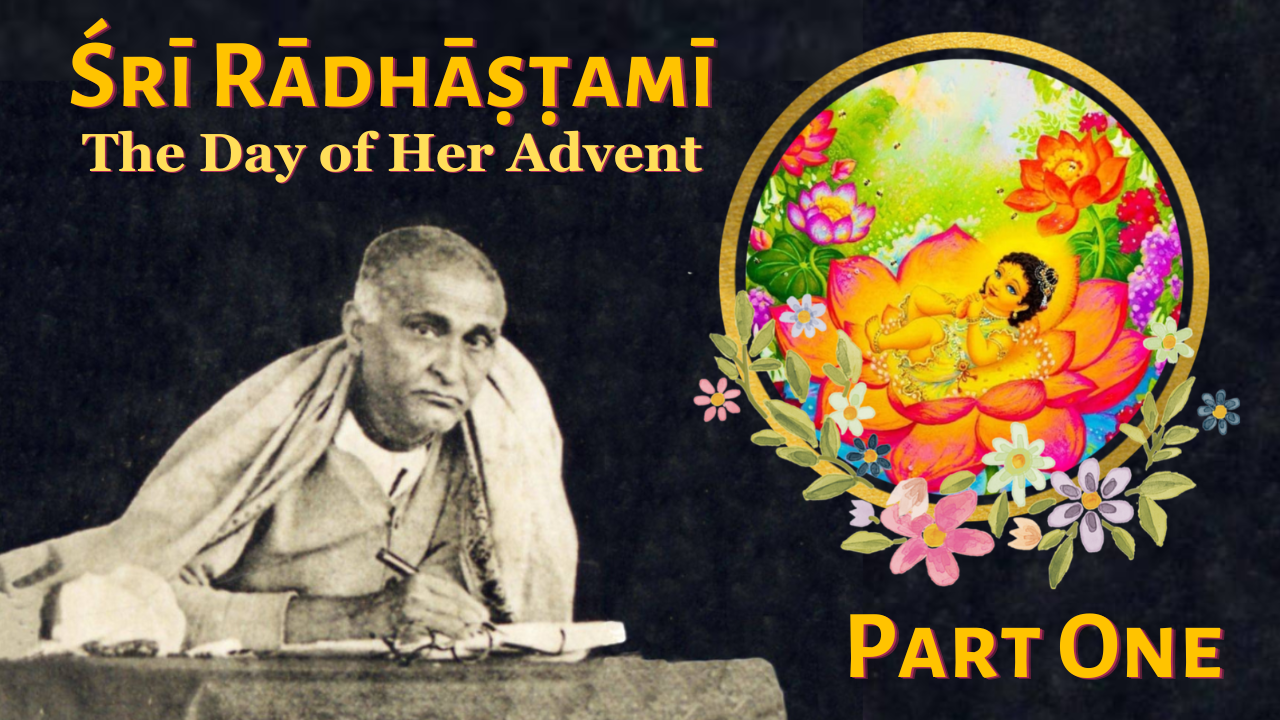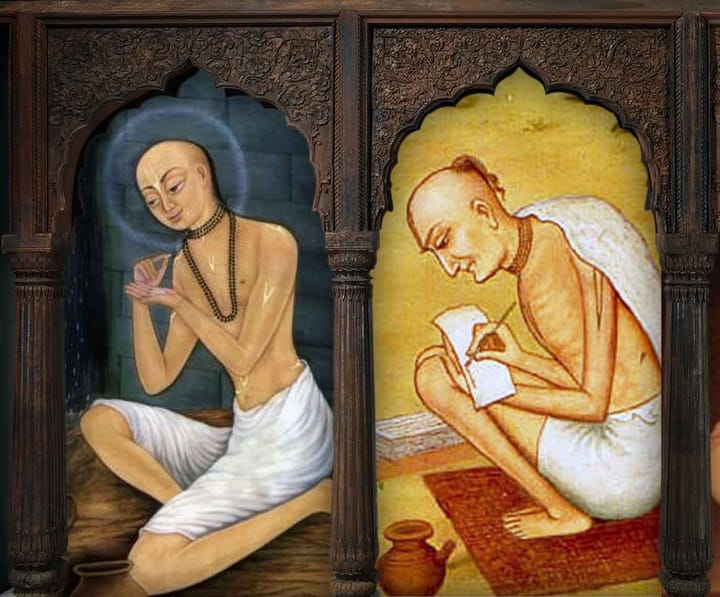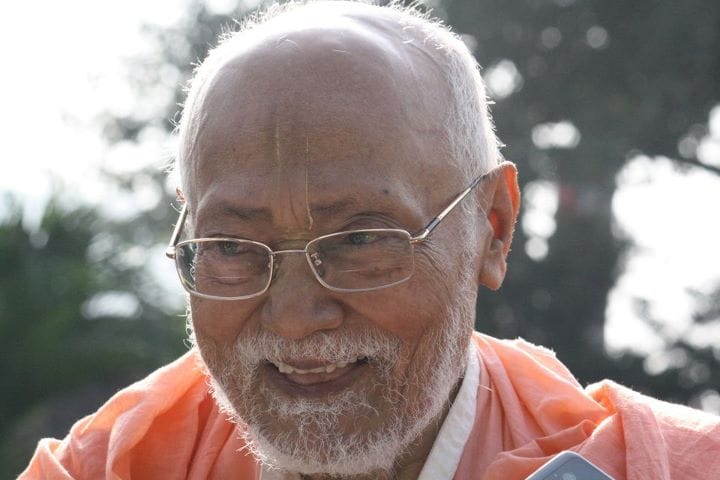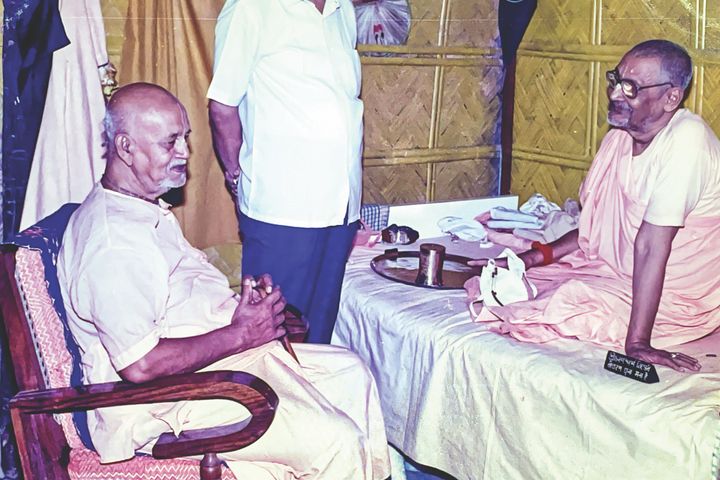Śrī Rādhāṣṭamī – The Day of Her Advent 🪷 PART ONE

Vṛṣabhānu-nandinī Śrīmatī Rādhārāṇī ki jaya!
Before presenting this remarkable article by Śrīla Bhaktisiddānta Sarasvatī Gosvāmī Prabhupāda, I'd like to share a couple of additional things to celebrate this special day:
- Three songs describing the festival of Śrī Rādhā's divine appearance. I also made some videos of myself singing them, which you'll also find in the link below.
- Last year, our Gaudiya Vedanta Publication team prepared a 19-minute video on the glories of service to Śrīmatī Rādhārāṇī and how our Śrīla Gurudeva, Śrīla Bhaktivedānta Nārāyaṇa Gosvāmī Mahārāja, very carefully established it as our ultimate aspiration.
- Want to memorize a verse in glorification of Śrīmatī Rādhikā? I prepared six verses for you to choose from.
The article below is Part One. I will send out Part Two in a few hours.
Jaya Jaya Śrī Rādhe!
Aspiring to please Śrīla Gurudeva and the Vaiṣṇavas,
-Madhukar das
Śrī Rādhāṣṭamī
The Day of Her Advent (PART ONE)
by Śrīla Bhaktisiddhānta Sarasvatī Ṭhākura Prabhupāda
A discourse delivered in the Sārasvata assembly hall
of Śrī Gauḍīya Maṭha, on Śrī Rādhāṣṭamī evening,
19 September, 1931
Published in the Weekly Gaudiya,
Year 10, Issue 11, October 1931
Translated by the Rays of The Harmonist team
for Issue No.20, Kārtika 2009
There is one person whose name is never mentioned in Śrīmad-Bhāgavatam. And yet Bhāgavatam’s steadfast readers constantly nurture the ardent hope of becoming that person’s devout, one-pointed servant. May that person, who means everything to Śrī Bhagavān, kindly destroy our false ego in all its various forms and bestow upon us the shelter of Her lotus feet.
Today is the day of Her advent.
That personification of grand benevolence, having collected all varieties of graces from Śrī Bhagavān to bestow as gifts upon all beings, is eternally the foremost of the benevolent. May She descend within our hearts and make Her appearance there, and may Her advent be the concern of our worship.
His all in all
It is common for us to hear that the entire earth is sustained by the entity known as Govinda. Many people speak in these terms. Yet there is one whom Govinda Himself esteems as His all in all, His sarvasva. And without the guidance of that entity, we cannot realize what it actually means that She is His everything, His sarva.
The word sva means ‘one’s own’, but it can also mean ‘one’s treasure’ or ‘one’s affluence’. One who is Govinda’s own, or one who is the affluence of Govinda, is Govinda’s entire fortune. The treasure that makes Govinda wealthy is naturally the very essence of His all in all – His sarvasva-vastu. We can only know the true meaning of loving worship when we make Her – Govinda’s sarvasva-vastu – the object of our own loving worship.
The devotees’ only cherishable hope
All the scriptures loudly sing that the form of divinity, the personality of Godhead, is the actual object of worship. Other than Him, no one can be worthy of the word ārādhya (the object of loving adoration). Due to being covered by ignorance for the time being, we have given up our loving quest to find Him and have cheated ourselves out of attaining love for Him. The very moment that we became covered by ignorance, anarthas[1] emerged, which led us to mistakenly perceive Him, the Supreme Lord, as some other entity. Our ultimate goal is to attain artha (meaningfulness), the antithesis of which lays in anarthas. If we do not take up a service attitude and pursue those goals, or perfections, available to us, which are most meaningful to us and dear to our hearts, and if we do not gain an understanding of the principles of service, then, swayed by our own arrogance and ego, we shall end up serving something other than He who is truly meant to be served.
[[ [1] Anartha – literally ‘unmeaningful’ or ‘of no value’; an unwanted or meaningless object or condition.]]
The attainment of pure love of God (prema) is the sole purpose of all worship. Thoroughly grasping this truth, we shall live by the ardent hope that one day we will be counted among Her entourage. Otherwise, it is preferable to die thousands of times.
āśā-bharair amṛta-sindhu-mayaiḥ kathañcit
kālo-mayātigamitaḥ kila sāmprataṁ hi
tvañ cet kṛpāṁ mayi vidhāsyasi naiva kiṁ me
prāṇair-vrajena ca varoru bakāriṇāpi
Vilāpa-kusumāñjalī (102)
[O Devī with graceful thighs, now, burdened by hopes of serving You, a hope which is itself an ocean of immortal nectar, I am somehow passing my time with great difficulty, as I wait anxiously. If You will not give me Your mercy then what use to me is my own life’s breath? What use to me is being in Vraja? What use to me even is Śrī Kṛṣṇa, who defeated the hideous crane demon, Bakāsura?!]
hā nātha gokula-sudhākara su-prasanna-
vaktrāravinda madhura-smita he kṛpārdra
yatra tvayā viharate praṇayaiḥ priyārāt
tatraiva mām api naya priya-sevanāya
Vilāpa-kusumāñjali (100)
[He Nātha, fulfiller of Your devotees’ cherished desires; HeGokula-sudhākara, moon of Gokula, who distributes cooling nectar to all the Vrajavāsīs. He Su-prasanna, He Vaktrāravinda, Your face, like a blooming lotus flower, is always cheerful as You grant all of Your devotees’ most cherished wishes! He Madhura-smita, You whose smile is so sweet and gentle! He Kṛpārdra, whose heart is melting from compassion! Please take me to that place where You and Your beloved Śrīmatī Rādhikā taste pastimes of overwhelming love for each other and let me intimately serve the two of You there.]
That hope, the devotees’ only cherishable hope, is an ocean of life-giving ambrosia. When will that hope bear fruit? I feel it is essential to sustain my life because of the hope that, some day, I will be counted among Her entourage. But alas, since our eagerness is not increasing, we are not fully realizing our hopes; we are not obtaining that which we have ardently been hoping for. If our hopes are not fulfilled this very day, if Śrī Govinda’s beloved, His all in all, does not descend within our hearts and make Her appearance there this very day, then we have been deceived and we shall not be able to find anyone more unfortunate than ourselves throughout all history. If we are cheated out of serving that person whose grace will grant us all that we may ever achieve – including our place within Bhagavān’s own holy abode and our connection to all things related to Him – and if we cannot comprehend Her true identity or discover Her presence in the 18,000 verses of Śrīmad-Bhāgavatam, then our study of the Bhāgavata has been worthless.
The perfection of loving worship exists solely in Her
Being intimately knowledgeable about Her identity, Śrī Gaurasundara spoke to us about unnatojjvala-rasa[2]. He enumerated the many methods of serving Bhagavān and instructed us in the process of serving Him purely, without the adulteration of any extraneous moods. It is only because He spoke to us about such matters that we can comprehend the existence of such a thing as ujjvala-rasa. And on account of this, we can indirectly comprehend the unpleasantness of its antithesis: the bleak, mundane rasa, with its utterly lacklustre sentiments.
[[ [2] The highest (unnata) mode of pure loving service to Bhagavān; the blazingly effulgent (ujjvala) paramour love conceived of by the vraja-gopīs.]]
In how many ways has Śrī Bhagavān personally offered us intimate knowledge of Himself just to make us relish transcendental service to Him? Yet it is essential that we wholly understand that person who has rendered such immense service to Śrī Bhagavān that He has made Her the object of His own service. Those who adoringly sing about Her can bestow upon us the qualification to serve Her; they alone can awaken anurāga(inexhaustible, ardent affection) for Her lotus feet in the core of our being. The intelligence and strength to serve Her is attained by keeping company with Her dear confidantes, who are in Her ānugatya (guardianship, or tutelage). By such company we can realize that service to Her is the highest purpose in existence.
As soon as we can come to understand, in light of the teachings of the mahājanas, that She is Śrī Bhagavān’s everything, we shall proceed to serve Her, knowing that the perfection and prosperity of loving worship exists solely in Her. If we engage in serving Her from this day forth, the day of Her advent, then we shall become qualified to reach the summit of auspiciousness.
Surely, all of us do not pray for that ultimate auspiciousness, but if by some unknown sukṛti (blessed activity) we get the association of one of the confidantes of Śrī Vṛṣabhānu-nandinī, She who is the embodiment and origin of supreme auspiciousness, and if we are truly granted the fortune of hearing genuinely sublime narrations about Her, then we, too, may develop the inspiration to follow the path of that ultimate auspiciousness.
But if we engage in self-deception by depriving ourselves of service to that person who means everything to akhila-rasāmṛta-mūrti [3] Śrī Nanda-nandana, and service to Her faithful followers, who are Her dear confidantes, we can never attain the eligibility to serve Śrī Govinda.
[[ [3] The condensed form of the entirety of all transcendent humours.]]
The secret
To understand Her identity, we believe that it is essential to first know Her name. Yet, while studying Śrīmad-Bhāgavatam we find no apparent mention of Her name anywhere. We only discover descriptions of Her form and beauty, praise of Her qualities, and accounts of the speciality of Her companions and Her pastimes. In Śrīmad-Bhāgavatam, we find everything about the dearest beloved of Govinda but Her name, as though it has not been mentioned there at all. Yet, in the verses of Śrīmad-Bhāgavatam, we discover something:
jñānaṁ parama-guhyaṁ me
yad vijñāna-samanvitam
sarahasyaṁ tad-aṅgaṁ ca
gṛhāṇa gaditaṁ mayā
Śrīmad-Bhāgavatam (2.9.30[4])
[[ [4] In the BBT edition of Śrīmad-Bhāgavatam, Verse 12 of this chapter has been treated as a separate verse. Consequently, this verse appears as 2.9.31 in that edition.]]
[Śrī Bhagavān said: “O Brahmā, knowledge of Me (jñāna) is the subject matter established in the revealed scriptures. Such knowledge is verily founded upon realization (vijñāna) of My svarūpa (intrinsic form) and also upon that esoteric secret (rahasya), prema-bhakti. Both are highly confidential. I am revealing all of this to you, and I am also revealing to you knowledge of sādhana-bhakti, which is the preliminary branch (aṅga) of prema-bhakti. Embrace all of this knowledge, and assimilate it with care.”]
kālena naṣṭā pralaye
vāṇīyaṁ veda-saṁjñitā
mayādau brahmaṇe proktā
dharmo yasyāṁ mad-ātmakaḥ
tena proktā sva-putrāya
manave pūrva-jāya sā
tato bhṛgv-ādayo’ gṛhṇan
sapta brahma-maharṣayaḥ
Śrīmad-Bhāgavatam (11.14.3–4)
[Śrī Bhagavān said: The divine message of the Vedas, which describe dharma related to Me, disappeared after the cosmic annihilation due to the passage of time. At the beginning of the next creation, I personally imparted that knowledge to Brahmā.]
In turn, Śrī Brahmā instructed this Vedic knowledge to his firstborn son, Manu, and thereafter the seven brahma-ṛṣis headed by Bhṛgu Muni accepted the same.
Śrī Bhagavān explained all these matters to the first created being, Brahmā, but over time the people of this world forgot His message, because the collective currents of their thought were naturally subjected to the effects of degeneration, dissolution and so forth.
jñānaṁ parama-guhyaṁ me
yad vijñāna-samanvitam
sarahasyaṁ tad-aṅgaṁ ca
gṛhāṇa gaditaṁ mayā
Śrīmad-Bhāgavatam (2.9.30)
Now, as I speak to you, hear My words and assimilate them. Knowledge of Me is highly confidential. It is knowledge fully grounded in realization, knowledge that is interwoven with secrets and therefore is itself an extremely intimate secret. The scriptural definition of the word rahasya is rahasi sthitaḥ – that which is situated in secrecy. Neither these secrets (rahasya) nor anything branching from them (aṅga) can be grasped through observation of some supposed objective reality.[5] Swept away by the currents of thought that dominate the external world, we have forgotten the essentiality of taking shelter at the feet of one who has true knowledge of the soul. Nothing else is so essential. Śrī Bhagavān remains in a state of perpetual readiness to reawaken this knowledge.
[[ [5] Rahasya here refers to prema-bhakti (pure, loving devotion), and its aṅga, or limb, is sādhana-bhakti (the practices employed to ultimately attain pure, loving devotion).]]
Śrī Bhagavān said to Brahmā:
Now, as I speak to you, carefully listen to My words and accept them in your heart. No one is qualified to hear or embrace this message without My grace. Only by My mercy shall those who hear and learn about Me gain this secret knowledge. What am I? What is My form (rūpa)? What is My intrinsic nature (svarūpa)? What are My qualities (guṇa)? What are the specialities of My associates? What pastimes do I perform (līlā)?
The stage of absorption in My transcendental pastimes, which are saturated with rasa, far surpasses the stage of absorption in ordinary mundane sentiments. There is no other way to know all this but through the potency of My mercy.
I am the foundation of all divine qualities. I am not speaking about qualities that are adulterated by passion and ignorance, but rather of those qualities that are the existential, causal basis of creating, sustaining and destroying the cosmos. Since I am distinguished by these qualities and since I am the instrumental cause of all effects, I am the original, fundamental entity. This can be known only by attaining My grace.
Therefore, Śrī Bhagavān has used the word mad-anugrahaḥ – My grace, or favour.
Information about Śrī Bhagavān’s aṅga aspect – namely sādhana-bhakti; information about His rahasya aspect – namely that most esoteric secret, prema-bhakti; information about his vijñāna aspect – particularly that realized knowledge which is saturated with sublime consciousness; and information of His personal splendour, which includes His abode, eternal associates and expansions (tad-rupa-vaibhava), are all supremely confidential, non-dual knowledge (advaya-jñāna). That eternal, highly confidential knowledge can only be attained by the mercy of Śrī Bhagavān. It is never revealed otherwise, for any reason. This secret knowledge is disclosed at the beginning of the four core verses (catuḥ-ślokī) of Śrīmad-Bhāgavatam. We are fortunate that Śrī Gaurasundara has revealed this mystery to the world, as though unlocking a treasure chest.
The secret should not be revealed to impersonalists
A secret (rahasya) has been mentioned, an account of it given, but the name of the person about whom this secret is concerned has not been disclosed. Since that name is a secret, it should not be disclosed to those subscribing to schools of ignorant thought, and has not therefore, been openly revealed. After hearing the pastimes of Śrī Nanda-nandana told in Śrīmad-Bhāgavatam, these ignorant people, what to speak of gaining any faith, discard all accounts of the Lord’s pastimes and just contemplate the impersonal feature of the Absolute, which is in line with their mundane conception. And some of them deem it sensible to merge their very selves with that impersonal reality. Without hearing from a genuine, bona fide source, people’s perception of reality suffers from this form of distorted vision. Due to their immense aversion towards serving the Lord, they can never comprehend the intrinsic nature of bhagavad-bhakti.
But, in our own hearts, which are radiant with pure, existential goodness (sattva), the day of rasa-mayī Parameśvarī’s advent has arrived in the course of the sun’s orbit. The roaming sun is today revealing the appearance of that Supreme Goddess. Hence, for us, the sun-god, too, is showing us supreme favour by unveiling the arrival of the secret at hand. Our duty now is to submit ourselves to someone who has knowledge of that secret. A poet by the name Manohara dāsa has said:
rādhā-pada-paṅkaja bhakata ki āśā
dāsa manohara kara ta’ piyāsā
[The bhaktas’ ardent wish is that they may someday serve Śrī Rādhā’s lotus feet. This is also Dāsa Manohara’s only aspiration.]
____
Part Two will come in a few hours.
Check your inbox or go to vineofdevotion.com in a few hours to read the second half of this article. You can also listen to my reading of it here.



Comments ()